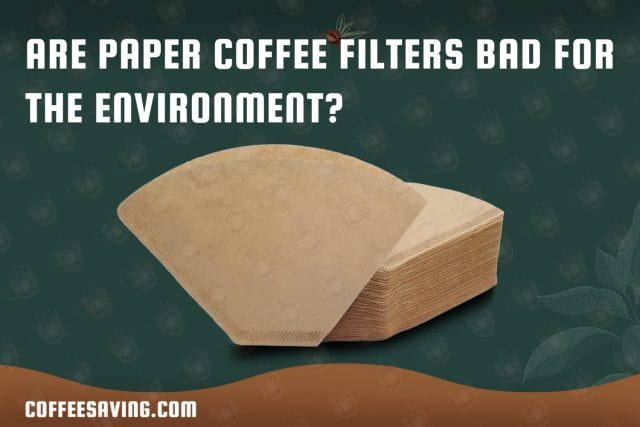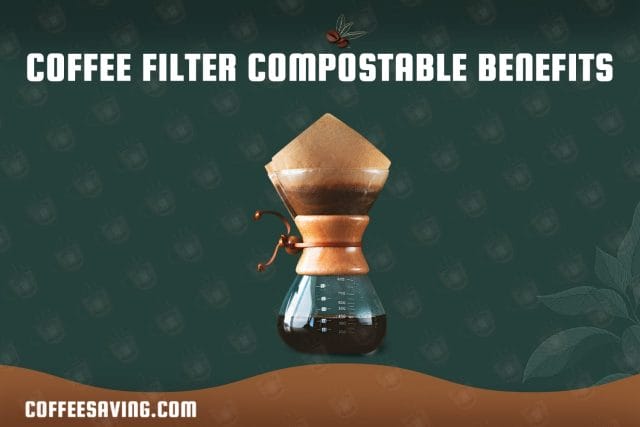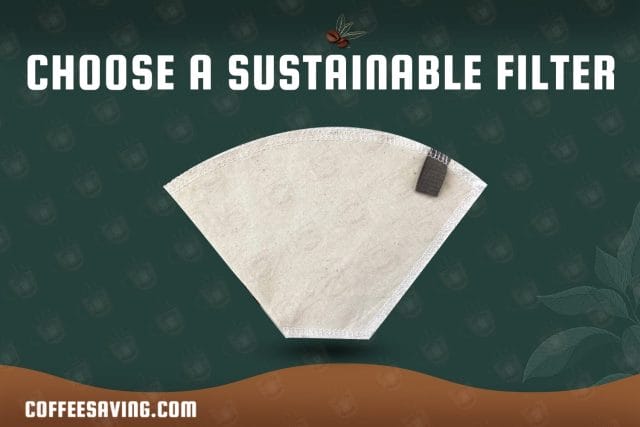Routines are the life’s barriers that help me get through a work-from-home day. If you enjoy coffee, you likely use a coffee filter at least once a day, either at work or home (or both).
The early-morning routine an essential component of my daily routine. This prepares me to be as energized, driven, and clear-headed as possible.
If you like coffee, having an espresso maker and filters in your cooking area. It might be a great addition to your home. Given that you drink coffee every day. You’ll likely discard a lot of coffee filters in the trash.
Why Do We Need to Know That Coffee Filter Bad for Environment or Not?

In one year almost six million tons of coffee beans are dispose of in landfills. Paper filter trash also comes with all that coffee, and it can take a while to decompose. Methane is a powerful greenhouse gas produced when paper filters break down. Additionally, the buildup of coffee filters in landfills raises the quantity of garbage. This is also placing more pressure on the limited landfill space.
How Does a Coffee Filter Work?

By removing the coffee beans from the completed product. Regulating the water flow through the grounds. Coffee filters are essential to the coffee brewing method. The amount of extraction and the flavor of the coffee are determine by this procedure. Coffee filters come in various forms. Most usable paper are metal, and cloth filters.
Different Shapes Available for Paper Coffee Filters

The most popular kind of filters for home baristas are conical ones. Disc filters are a less common variety that are use for specific applications. Basket filters are the most common used form with a flat bottom.
Coffee Filter Types

There are different types of filters used for coffee. Paper coffee filters use daily, but they are thrown away afterward. Coffee filters made of bleach paper also to producing waste volume.
Although oxygen is more beneficial for environment than chlorine. So, think about switching to reusable filters or utilizing unbleached ones. Put the coffee grinds and metal coffee filter in the coffee maker basket to use it. The filter taken out, sanitized and used again for future batches of coffee.
Plastic is often produced using resources that are not renewable. Sustainability benign substitutes to petroleum-based polymers only degrade under specific environmental circumstances.
Are Paper Coffee Filters Bad for the Environment?

Coffee filters are a great way to make a delicious cup of coffee; what about their impact on the environment?
Biodegradable Coffee Filter
The most common material used to make coffee filters is paper, which decomposes. Filter paper is a biodegradable box made of cellulose, a non-recurring plant fiber. They aid in the breakdown of organic materials when added to a compost pile.
Coffee filters degrade because of their thin construction, especially when wet. Due to this they are biodegradable and compostable, they won’t affect the taste of your coffee. This make a wonderful contribution to your compost pile, and less pollution in the air.
Bleached Vs Unbleached
Different coffee filters are available in market. But the two most common ones are bleached and unbleached coffee filter.
Bleached Paper
less amounts of oxygen bleach used to whiten bleached coffee filters. Both are not particularly good for the environment. Because bleach and chlorine have a negative impact on the environment.
Making coffee with bleached paper filters is harmful to your health.
Unbleached Filter Paper
Are unbleached coffee filters not good for the environment?
Unbleached paper coffee filters are more environmental friendly. This have not treated and maintain their original taste and color.
The flavor of paper that they often leave in your coffee after brewing is their major drawback. All you have to do to fix this is place the filter in the brewing machine and wet it with hot water. Ensure that the water that disposed of that drips out of it.
Unbleached coffee filters are the best option for people. Who want to use only organic compost for their gardens and plants.
How Can Used Coffee Filters Be Composted?

We need to keep in mind which type of material used in coffee filters. There are several type of coffee filters are available.
If you want to maintain your bin yo can follow some suggestion:
Don't Dry Them Out
Moisture and temperature are two important elements that encourage decomposition. moisture speed up the microbial metabolism.
Which speeds up the breakdown of the coffee filters. Instead of leaving your used paper filters on the surface of the compost, bury them there to keep them moist. This should hasten their decomposition.
Cut Them Up
Paper filters degrade and dissolve more faster when cut into smaller pieces. To faster decomposition in your compost container. Then fold your used paper filters into pieces.
Coffee Filter Compostable Benefits

Optimizes Soil Structure
Improving soil structure is one benefit of composting coffee filters. when the microorganisms break down in the compost . These filter papers create a situation that is suitable to their growth. These microbes help aerate the soil, which facilitates the growth of plant roots.
Reducing Waste
A great approach to less waste and support sustainable way of life is to compost coffee filters. You waste less quantity in landfills by putting this compostable stuff into the compost pile rather than throwing it in the trash.
As a result, there is less pollution and a drop in greenhouse gas emissions.
Improving Compost With Nitrogen
The addition of nitrogen to the compost is a benefits of composting coffee filters . Nitrogen is a nutrient crucial for plant growth. Most garden soils lack enough nitrogen.
Non paper filters, metal filter , plastic filter and metal filters are not compostable. For composting, paper products are the most ecological option.
Choose a Sustainable Filter

The water, air, soil, and trees are all negative affected by paper trash. You can make coffee without filters using French press or another unfiltered method.
Use a organic cotton filter if you want to filter out some of the inflammatory components in your coffee. Organic cotton is affordable, renewable and sustainable. Many sustainable substitutes of coffee filter improve your landscape and reduce waste.
Keep up an sustainable coffee practice by looking at reusable filter options . Additionally, a single cotton filter may substitute up to 12 paper filter boxes.




